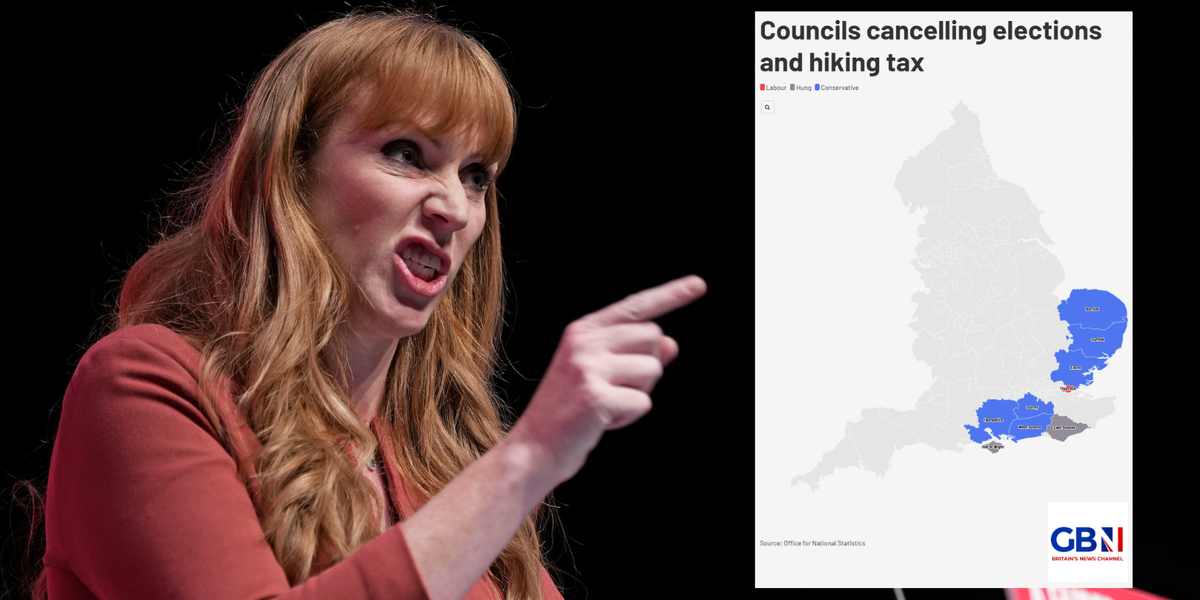Labour’s plan to reform councils in England could backfire and end up costing taxpayers more than it saves, analysis has shown.
Keir Starmer’s party wants to radically overhaul local government by abolishing 185 ‘two-tier’ authorities made up of county and district councils and replace them with new unitary authorities in 21 areas.
Proponents argue unitary authorities streamline governance by eliminating duplication of services between county and district councils whilst providing clearer accountability since a single body is responsible for all local government functions, making it easier for residents to understand who is in charge.
PwC (PricewaterhouseCoopers), a large accounting firm, has released analysis showing the reorganisation could save at least £1.8billion over five years, a lifeline for cash strapped councils.
Angela Rayner wants to reorganise local government in England
PA
However, analysis of PwC’s report by the County Councils Network reveals this saving rapidly reduces if unitary authorities do not cover populations of over 500,000 people.
If unitary authorities only covered roughly 300,000 people, reorganisation would actually cost the taxpayer £850million over five years and deliver no savings, for example.
This is because the greater the number of new unitary councils and the smaller the size, the more costs are incurred from ‘disaggregation’ – the process of splitting up and duplicating county council social care services.
Further, more unitary authorities leads to higher one-off transition costs and lower long-term efficiency savings.
Most expensive council tax rates in England
GBN
Because of this, it would be more efficient to retain the current two-tier system in England.
The government had initially committed to keeping the unitary authorities over half a million people, but Local Government Minister Jim McMahon recently indicated proposals for unitary councils below the 500,000-population number could still be acceptable.
In response, CNN has warned it is ‘absolutely essential’ the government stick to the 500,000 minimum population threshold.
The CNN says that failure to do so will mean the government will fall short in their promise to end the ‘two-tier’ financial premium and create ‘billions’ in efficiency savings, whilst creating hundreds of millions of new costs for care services.
Not only will unitary authorities save £1.8billion over five years if they cover 500,000 people, but they will also save £500million a year every year there afterwards.
The level of savings increases even further if a minimum population threshold of 600,000 was applied, resulting in a net-saving of £2bn over five years.
Local government minister Jim McMahon
PA
Cllr Tim Oliver, Chairman of the County Councils Network, said: “Today’s new analysis by the County Councils Network (CCN) shows local government reorganisation could unlock billions in efficiency savings to be reinvested in frontline services.
“But it can only do this if new councils have populations of at least of 500,000 or more.
“While it may be necessary for some areas to create more than one new council, this analysis shows that splitting county councils into multiple small unitary councils with populations as small as 300,000 will create hundreds of millions of new unsustainable costs, piling further strain on already under pressure care services.
“It is absolutely essential that the government now stick to the statutory criteria they have set out, treating the 500,000 as a minimum not an optimum population scale.
“This will ensure we create new councils with the scale and capacity to deliver substantial savings to be reinvested in frontline services to the benefit of local taxpayers.
“Failure to do so could mean the government fall short in their promise to end the ‘two-tier’ financial premium.
“The CCN is not being dogmatic over whether an area chooses to reform into one or more unitary authority.
“It is ultimately up to local areas to choose which option to pursue, considering both the financial implications and other impact factors. However, they must do so mindful of the costs and risks involved in the reorganisation process.”
LATEST FROM MEMBERSHIP:
Councils cancelling elections
GBN
It comes after local councils were thrust into the limelight by Nigel Farage after it emerged Secretary of State for Ministry of Housing, Communities and Local Government Angela Rayner has allowed nine authorities to postpone elections.
The government argues it makes no sense to hold elections that cost taxpayer money for authorities that will be imminently abolished.
But critics like Farage say it is a ‘denial of democracy’ while Rupert Lowe cited the Founding Fathers’ ‘no taxation without representation’, implicitly urging people to withhold their council tax.
Of the nine councils postponing elections one is Labour controlled and the rest Conservative, prompting Farage to say the Tories are ‘running scared’.
A Ministry of Housing, Communities and Local Government spokesperson said: “Due to the inheritance we have been left with, we must reform a crumbling system unfit for purpose.
“We’re working with councils on ambitious plans to reorganise local government. This will deliver much needed long-term and lasting reform that will help give them the stability they need, so they can deliver better value for money services for residents.”

